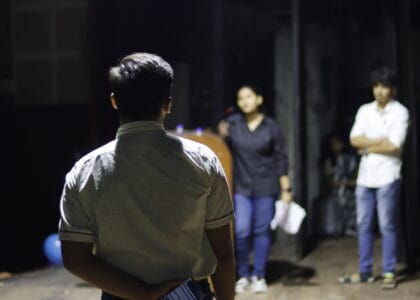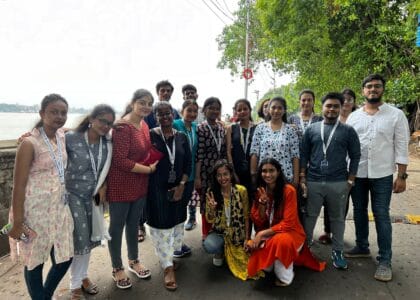PROJECT AIM
Project Maa represents the essence of motherhood, care, empathy, and dignity. The initiative is Rigel Foundation’s flagship event, centered on breaking the taboo surrounding menstruation and providing sanitary pads to underprivileged women. By distributing pads openly, the project challenges societal stigmas and promotes awareness around menstrual hygiene—a basic yet often ignored health necessity.
PROJECT SUMMARY
This iteration of Project Maa was led by Debajyoti Manna, with a team of dedicated interns from St. Xavier’s University, Kolkata. The event was executed with zero dependency on external agencies, demonstrating the leadership and self-sufficiency of the student interns involved.
Key Highlights:
- Planning & Procurement:
- The project was suggested and supported by Executive Director Mr. Debajyoti Manna.
- Two interns collectively procured 400 branded sanitary pads from the wholesale market using the collected funds.
- Although the funds were reimbursed by the Treasurer, the interns proactively managed the buying process.
- Logistics:
- Intern Mr. Spandan Roy stored the purchased sanitary pads at his home.
- Due to a last-minute medical emergency, he could not attend the event, but ensured smooth handover of the pads to another volunteer at Dum Dum Metro Station.
- The volunteer then delivered the materials safely to the event location.
- Event Execution:
- The event was carried out in the Bhootnath Temple slum area, targeting underprivileged women who often lack access to menstrual hygiene products.
- While some women were initially hesitant to accept the pads, the interns respectfully educated them about menstrual hygiene, overcoming resistance with dignity and sensitivity.
- A few women could not be convinced in the short time available, but the majority responded positively.
- Local police extended their support by escorting the team and ensuring safety throughout the event duration.
IMPACT
- 400 sanitary pads were successfully distributed in one of Kolkata’s densely populated low-income neighborhoods.
- Interns led the initiative entirely, from logistics to distribution, showcasing ownership, compassion, and leadership.
- The event generated a strong community-level conversation about menstrual health and helped normalize open discussions around it.
- Local law enforcement’s involvement amplified the event’s legitimacy and safety.
TAKEAWAYS
- Intern Leadership: The interns exhibited exceptional initiative, handling every aspect from procurement to distribution with maturity and efficiency.
- Taboo Breaking: Distributing pads in public spaces helped destigmatize menstruation, especially in vulnerable communities.
- Ground-Level Education: The team’s ability to engage and educate hesitant women reflects strong interpersonal and communication skills.
- Support System: Strategic support from senior officials and Kolkata Police enhanced operational ease.
CONCLUSION
Project Maa 4.0 was a landmark success for Rigel Foundation and the interns involved. It wasn’t just about donating sanitary pads—it was about challenging stigmas, empowering women, and instilling empathy and responsibility among the youth. From procurement to on-ground execution, this event was single-handedly managed by interns, with only guidance provided by senior members.
Their efforts not only fulfilled the core mission of the project but also highlighted the immense potential of youth leadership in driving social change. Project Maa continues to stand as a symbol of dignity, awareness, and hope for many women in underserved communities.








